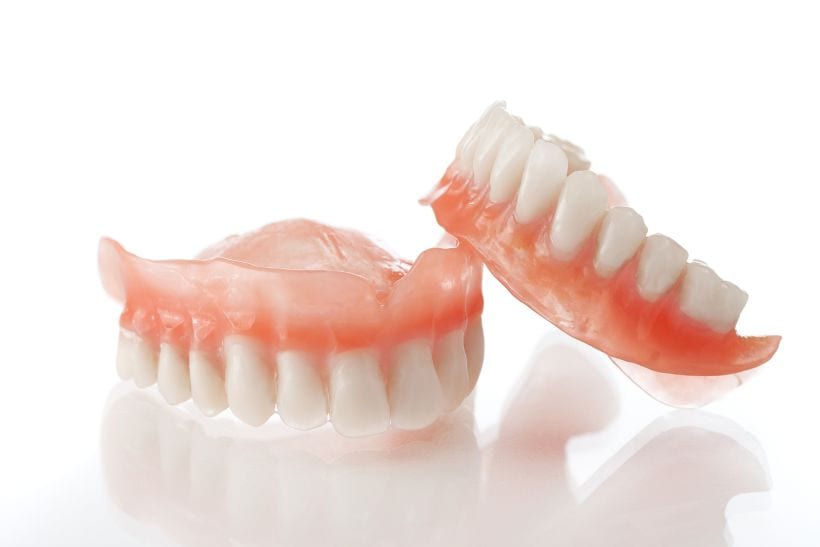If you’ve just been introduced to dentures, the chances are that you might be concerned about denture adhesives. You should know that as a beginner, you don’t require the use of adhesives at first. But as time passes, you need one to keep your dentures in place. So in that case, let’s dedicate the article to discussing the 5 benefits of denture adhesives.
But before we do that, there are other important things you need to know about adhesives.
What Is A Denture Adhesive?
It is nothing but a water-soluble, non-toxic material that you apply on the dentures. The adhesive comes in contact with the tissues located in your mouth. And it does so to enhance the fit and hold of the dentures.
The best part about adhesives is that they are available in powder and cream form. Both do an excellent job at reducing the movement of the dentures and preventing slippage. The latter is useful when you perform actions such as laughing, sneezing, coughing, speaking, and eating.
How Does A Denture Adhesive Work?

Living with dentures is not as complicated as it sounds, especially when you’re using an adhesive. And that’s because it does an excellent job at adhering to your mouth tissues and dentures.
You should know that saliva has the ability to adhere to the tissues as well as dentures. But the adherence of adhesives is far greater than saliva. This is why there are so many commercial denture adhesives on the market. And they all offer enhanced adherence and coherence even in the presence of water or saliva.
If you’ve been wearing dentures and using adhesives long enough, you know how the latter increases satisfaction. And this is highly useful for those with permanent dentures.
So maybe now it’s time to talk about the 5 benefits of denture adhesives. But only after I tell you how to use denture adhesive!
Using Denture Adhesives
When you choose the good denture adhesive, in paste or powder form, the application is quite easy. You have to apply it directly at the bottom of your denture. This creates a seal or suction to the gums. And feel free to use the adhesive on a daily basis or when need be.
This means you can apply the adhesive during your meal times too. At this point, it helps in keeping the dentures in place and preventing slippage during chewing. The solution brings maximum comfort into the picture.
But like I said earlier, it’s important to opt for a well-reputed brand if you’re going to be using it daily.
Now let’s talk about both the advantages and disadvantages of denture adhesives.
5 Benefits of Denture Adhesives

#1 Fight bad breath
The adhesive contains antibacterial properties and such an action is responsible for keeping your mouth fresh for as long as six hours.
#2 Strong hold
The majority of denture adhesives available provide a thin yet strong layer. This creates a binding force between your gums and dentures. So you can rest assured knowing that the dentures won’t fall off or even move around in your mouth throughout the entire day.
#3 Protection seal
What denture adhesives do is form a protective seal that contributes to eliminating discomfort and irritation. So you don’t need to worry about food particles like nuts and seeds getting stuck in the dentures.
#4 Prevent slippage
The worst part about wearing dentures is that they tend to slip out as your gum is subjected to changing shape over time. And I can understand how irritating and embarrassing this can be. In that case, nothing beats the effectiveness of denture adhesives.
They do an excellent job at preventing slippage by securing the dentures to your gum surface. Such a strong force keeps the dentures in their rightful place. So you can talk and eat comfortably in public.
#5 Add comfort
Did you know that dentures have a rigid, hard construction? And this is not easy for your gums to handle, especially during chewing food. At these moments, adhesive acts as the much-needed cushion between the hardness of the dentures and softness of the gum tissues.
When you use denture adhesives, the process of chewing hard food also becomes less painful. And it’s because of this protective seal that food particles don’t enter the gap to cause gum discomfort.
3 Disadvantages of Denture Adhesives
#1 Zinc contamination
As a daily denture wearer, you should know that adhesives contain zinc content. So it’s important to pick a denture adhesive with the least amount of zinc present in it. And that’s because excessive zinc in the body can cause nerve damage, numbness, or tingling sensations.
#2 Maintenance
When using dentures, daily cleaning is necessary. Another thing that you have to keep in mind is that old adhesives need replacement to avoid bacteria and infections. And all this requires you to make an effort.
#3 Messy application
It doesn’t matter if the denture adhesive is in paste, liquid, or powder form. When applying it, there’s nothing you can do to make the process any less messy.
Final Thoughts
I hope the 5 benefits of denture adhesives are convincing enough to push you in the right direction for keeping those dentures in place. Because when that happens, simple movements involved with talking and eating become smoother and easier.
In fact, when you use the best denture adhesive, you tend to forget about your dentures entirely. They start to feel like natural teeth.
So tell me, have you ever used an adhesive? If yes, then what brand has worked the best for you?
You can drop in your thoughts and feedback in the comments section.
And let’s not forget to share!
About the author:
Christian Olsen is a passionate blogger who loves to share all kinds of useful content. His goal is to provide practical information about everyday products. The kind of detailed reviews and valuable tips that he offers on his blog are easily relatable. And that’s because Olsen creates content that stems from personal experiences.








